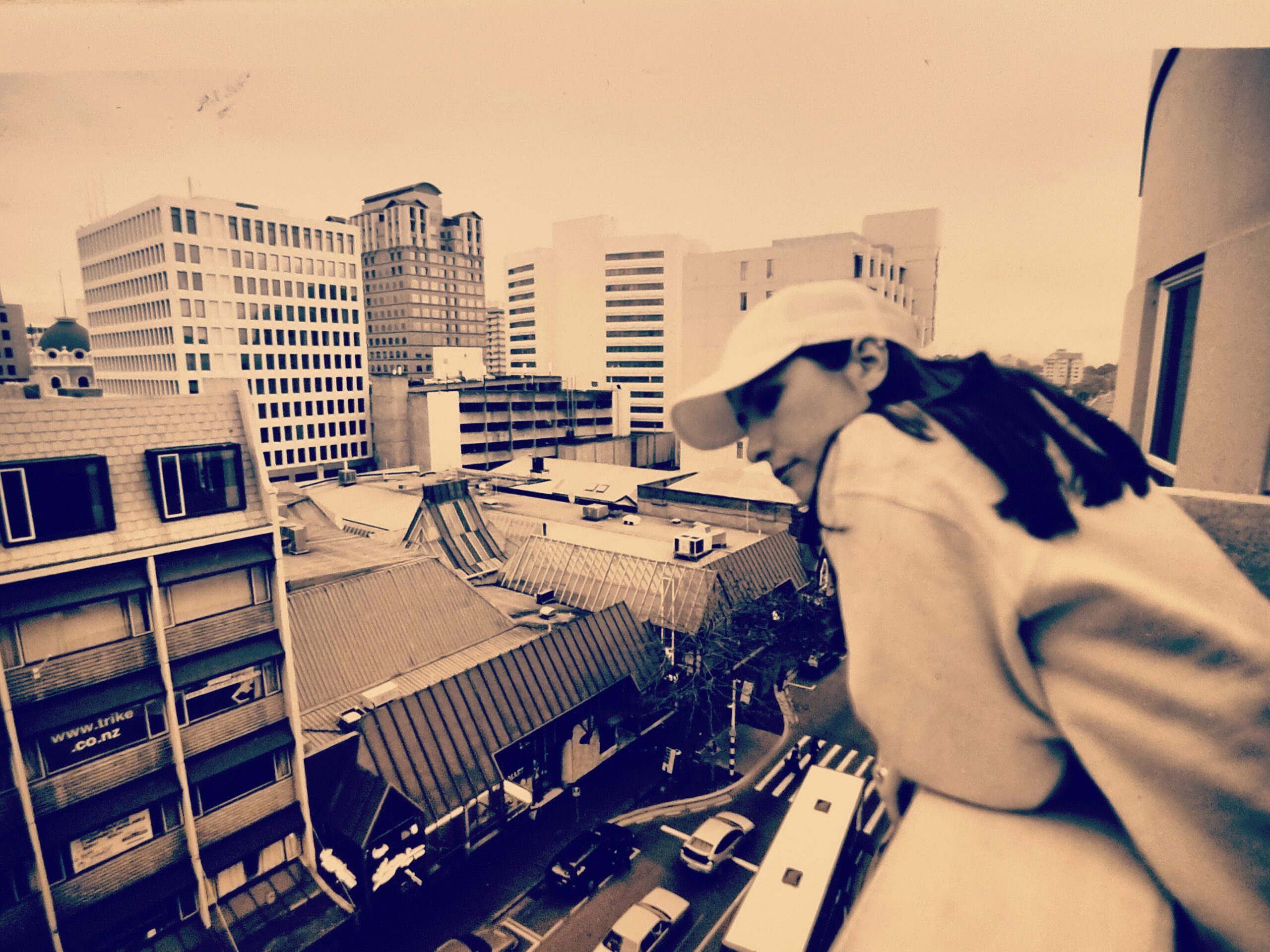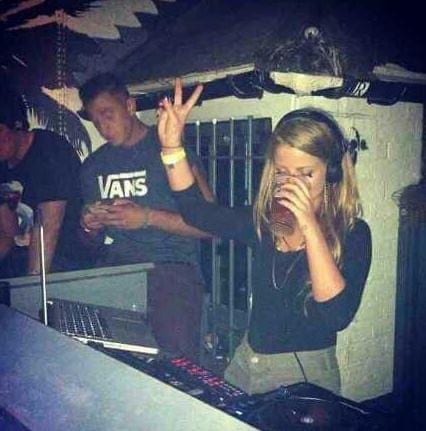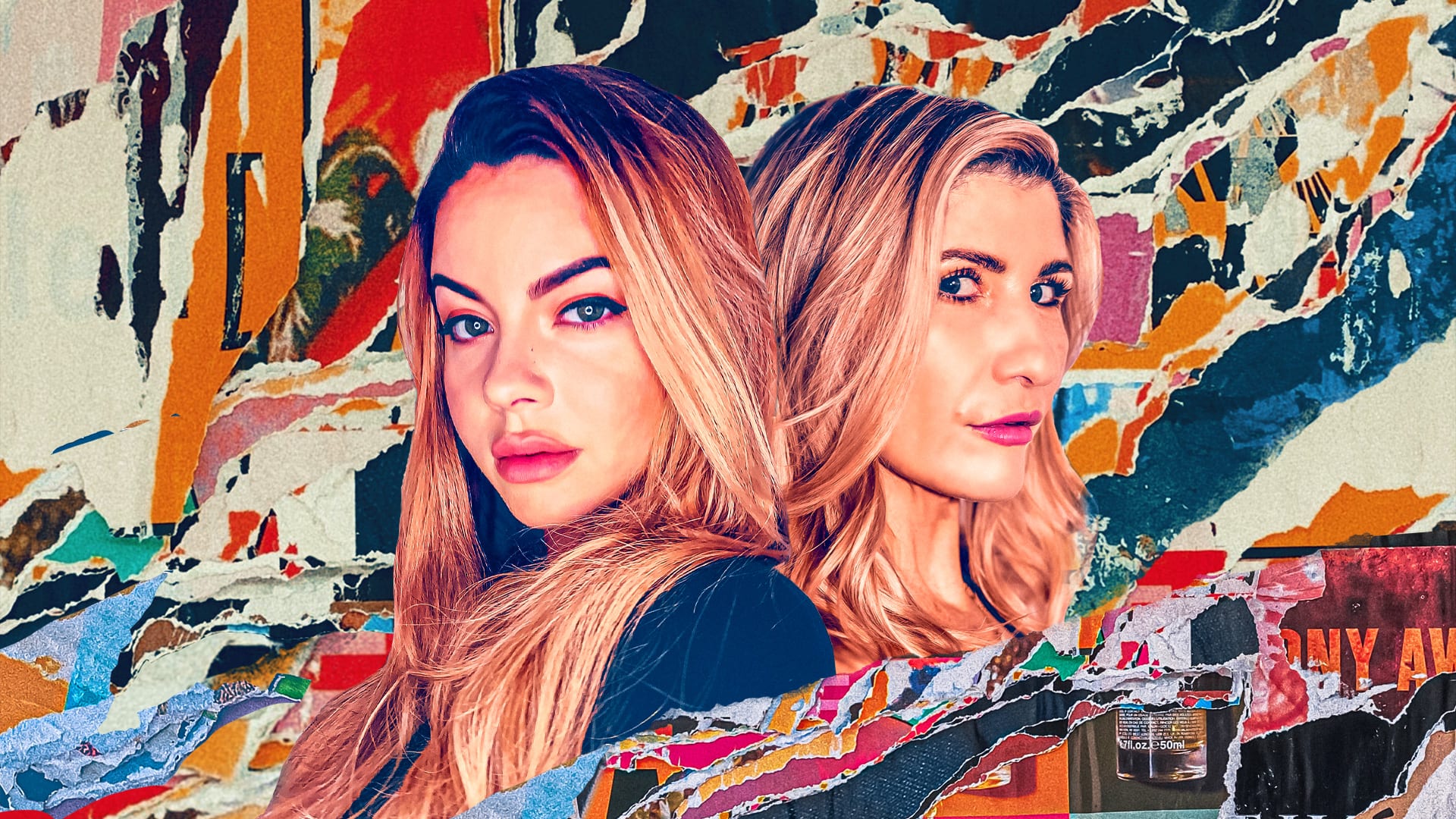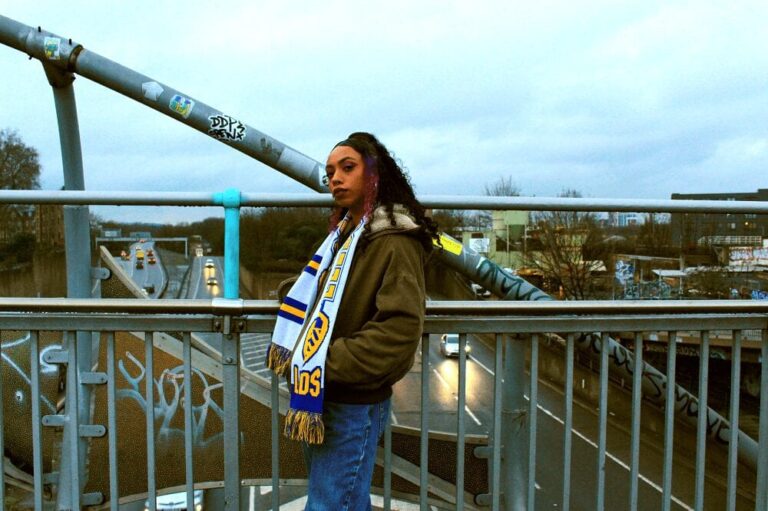Up next in our series where the artists interview each other are Harriet Jaxxon and Tali, discussing inspirations, how to hustle, pale male stale line-ups and being mistaken as the DJ’s girlfriend…
Back in March Harriet Jaxxon dropped her second release to date: What We Gonna Do. Fronted by the instantly distinctive vocals and lyrical prowess of New Zealand drum & bass superstar Tali, the track hits with a heavyweight fusion of Dillinja bassline energy and raw Full Cycle soul.
Out on Drum&BassArena and causing serious dents in Andy C’s recent NZ sets, Harriet’s streams and Rinse shows, and beyond, the track also lands at a perfect time for Tali, too. Following our recent interview with her, Tali has continued to hold down her lucky home country crowds during festival season (both as an MC and with her live band) while balancing it with many other creative missions from tutoring to management to writing.
As both artists continue to tear-up 2021, we got them together on a video call and asked them to interview each other. Get to know.
Harriet: There are some things I’d like to know. We know you came to the UK when you were younger but I’d like to know what prompted you to do that and what your D&B experiences were before coming over?
Tali: I guess the first year that I was really influenced by rave music was 97. That’s when I went from ‘I like raving and all music’ to ‘no, D&B is my life!’ When I first started MCing I thought I wanted to be a hip-hop MC, but I went to a rave and everyone was dancing and hugging and dressed really cool. I was like ‘this is wicked!’ The DJ dropped Krust’s Maintain with that vocal that goes “in this world of mine” and I was like ‘Woah this is amazing.’ So it was the rave culture that I liked and the music that I liked. Then I heard MCs for the first time on tapepacks being sent over from the UK – like Moose and Navigator – and I was like ‘Ah okay, there’s rapping and then there’s rapping over the music I like. That’s what I want to do.’
So as I dug into it, I found the music within drum & bass that I really liked. A lot of the Bristol stuff, hearing voices like Dynamite and Onalee on the same record. I wanted to work with these people. My dream was ‘I’m going to go to the UK and turn up on Roni’s doorstep and he’s going to sign me!’ But the universe had other plans. I actually met Roni while I was waitressing in Melbourne to save money to go to the UK and meet him. I met him backstage, I sang for him and MC’d for him. He was blown away, he put me on the mic, we exchanged details and he told me to ring him when I got to the UK. When I came to the UK I hit him up and we started working together. The UK is the mecca of DNB – where else would you want to work?
I have to say I actually came to the UK before in 1999, too. I won a talent competition on the TV. I went with my boyfriend who is now a well known and very talented producer now based in the UK. Back then he was a promoter. He was like ‘Right! We’re going to Metalheadz, we’re going to Swerve, we’re going to Bar Rumba’. Seeing the scene in the UK was enough for me.
Harriet: No way! Looks like it was fate for you in the end then… That’s a sick story.

Tali: What about you though? How did you get into it?
Harriet: It’s interesting you said about getting into rave culture and the finding your music. I was kinda the same. All my friends were going to clubs playing chart music and I enjoyed being with them, but I was never into the music. Then I was at V Festival, which is a very commercial festival over here, and saw High Contrast playing. My friends wanted to see Taylor Swift but I was like ‘I’m not leaving!’ From there I went to more clubs and it was drum & bass I was enjoying the most. I lived in a little seaside town and there was this little club that had D&B DJs down. The promoters were really switched on and booked loads of great DJs and I just started tagging along with them. I’d go back to theirs after the show, they’d sit there and chill and I’d be mixing on their decks. Then I decided to do a music technology course and I surrounded myself with people and technology in this world. Then I started playing the warm-up sets at this night and it went from there.
Tali: Was there anyone who you saw and you thought ‘I wanna be like that person!’
Harriet: One of the first times I went to London to a drum & bass rave was with these people. I couldn’t have gone with my friends because they weren’t into it. That was Andy C at Brixton Academy. I knew about Andy at the time but had never seen him and I became obsessed. I got very into Ram Records. I even got a Ram Records tattoo on my neck to show my dedication.
Tali: Wow I didn’t even get a Full Cycle tattoo! That label changed my life and was a huge source of inspiration but I’m glad I didn’t get one now because it wouldn’t have gone with the style of my other tatts.
Harriet: It’s nice though. It’s like a community vibe in D&B, so if you see someone with a tattoo or a t-shirt of your favourite label or artist it’s like ‘Yeah, you know!’
Tali: Yeah I do like that.

Harriet: So New Zealand is hugely into D&B right now. Was that happening when you grew up there?
Tali: 100%. The reason why everyone is paying attention to NZ now is because you’re on lockdown and we can rave. So there’s that focus at the moment. But back in the day we were putting on parties. Myself and my then boyfriend had a promotions company called Scientific. And you also had Jeff who now runs Samurai Records. He was also running parties in Auckland. We were kinda in competition with each other but there were only the two of us running parties. I think there are too many promoters over here now and a lot of people are stepping on each other’s toes and going about it the wrong way. But back then it was quality over quantity and DJs wanted to come to NZ. Back then the culture was huge and Christchurch was the Mecca. We had a club called the Ministry which was legendary and the first DJ we booked was Bailey. He played a four-hour set and said it was one of the coolest sets he’d ever played and he couldn’t wait to come back again.
The first time he came over it was with MC Flux but the second time Flux got stuck in Australia so I stepped in. I hadn’t been MCing that long. I’d only done local club nights and it was my first international DJ. So not only did I feel we were letting the ravers down by Flux not turning up but then I’m like ‘Oh hi, it’s me!’ But everyone was really cool about it. The culture was different. It was still underground. Now you hear it everywhere; on daytime radio, TV commercials, the All Blacks run out to Shapeshifter. D&B has permeated the mainstream but back then we were the underground – we had our own clothing ranges, our own radio shows, our own magazines. It was huge still; we’d have 600-700 people in clubs and at festivals we’d have our own D&B tents.
Harriet: That’s really interesting. So you had that foundation there?
Tali: Oh yeah. We brought over Bailey, Shy FX, Bryan G. They were our first three DJs. Jeff brought over Andy C, Doc Scott, Dom & Roland, Ed Rush & Optical, Kemistry & Storm, which was life-changing for me to see. Right now though it feels very pale male stale. With the exception of a few MCs it does feel very generic. The sound is the same, the people look the same, they’re all dudes.
Harriet: Do you mean the artists coming over, or the crowds?
Tali: The artists. That’s no offence to the DJs who are coming over, they’re all smashing it. But with the commercialisation of D&B over here, and the climate of covid, means people aren’t taking risks. Back in the day we’d lose money but two months later we’d make that back. We took risks and I don’t think people are doing that now which is detrimental to the education of fans. D&B doesn’t begin and end with Wilkinson. He’s a great starting point but there’s a lot more to this music. I do understand that and we’re living in very uncertain times so people aren’t necessarily going to take a risk. But we’ve taken risks at Liquid Lowdown, which is a night my husband Chiccoreli runs. The nights are more curated. Liquid isn’t as commercial out here so he’s been able to take those creative risks. Recently we had Monrroe, we’ve also brought out Satl, Pola & Bryson, Krakota. More liquid DJs. We want to educate the masses and show there’s a time and place for liquid as well as the big mainstage stuff.
Harriet: I guess you’re talking about variety really. Social media plays a big role in this too doesn’t it? Those reactions to the big tunes in videos gives people the impression they can only get big reactions when those type of tunes are dropped.
Tali: That definitely has an influence. So we’re taught to be very humble over here and when I came back from the UK I was accused of being aggressive because I hustled. That’s what everyone was doing in the UK so I applied that here. People don’t do that here and if you do it you’re pushy, especially if you’re a girl…
Harriet: People confuse confidence with arrogance sometimes.
Tali: Well that’s what I was going to ask you. Have you ever had anyone assume you’re pushy?
Harriet: Yeah the hustle is very familiar and I’ve only had a team with a manager and agent in the last few years so over half my career I was my own manager and agent and I was hustling a lot. I did the groundwork and hustled more behind the scenes. I’d see an event which I really liked the look of so I’d find who ran the event on social media and start following them. It was quite calculated but organic at the same time. I’d just make sure I was in the right places so I wouldn’t have to vocalise it too much. That worked for me. I toured with Ministry Of Sound before I signed with Ram and I developed those opportunities myself, following the right people and talking to the right people. It was all sincere. I just think you definitely have to be confident in your ability but aware of what lane you’re in.
You do have to be humble over here. It’s a turn off to people when it looks like arrogance but you do need to be assertive in the content you put out and in your creative expression. It’s all part of a strategy but it has to be led by what you think is good as well. Also, I really don’t pay much attention to what other people are doing, I focus on what I’m doing. If you’re following trends then you’re always one step behind. But if you’re sticking to your integrity and what you believe it good that’s what’s going to set you apart.
Tali: You say that, but there are so many men in the scene who are doing what everyone else is doing and they’re successful. I think for a woman it’s not enough to be good, you have to be great, you have to be different, unique and special and I love that you’ve stuck to your own lane.
Harriet: Do you feel you have?
Tali: I’ve gone through periods and looked at other people and thought ‘I need to do this because it will get me there’ So like maybe singing on a dubstep tune. At the time I enjoyed that, but it never felt like me.
Harriet: This is the thing. Maybe artists starting out and getting a hype so soon that they haven’t sat back and observed the lifecycle of a career. From the get-go I knew I wanted longevity. I went through periods of not being patient and thinking ‘I need some action! I need to jump on this sound’ or whatever. But when I started working with my manager Scott he explained about longevity to me fully. Only time can tell how valuable your hype is. No one wants to just be popping for a two year trend and that’s it.
Tali: Yeah I think so. It’s also important to read a room though. I’ve seen artists stick to their guns too much and only play what they want to play and then you never see them again. Like at the time when I made that dubstep tune I was in it and loving it but for me I knew my soul was in D&B. But I also realised it wasn’t just music I needed to fulfil me. I needed to be writing, I needed to be teaching, I needed to be mentoring. For me a big part of it is legacy. I can’t have children so I want to make my life exciting and for it to mean something and leaves something after me. And as I’m getting older I don’t need to justify myself. I had to prove myself a lot. I had imposter syndrome and it’s an insecurity that doesn’t go away. But then when I came back to NZ all my friends and fans I made before I came to the UK had grown up stopped raving. So I had to introduce myself to a whole new generation of ravers who didn’t know what I’d done before so I had to prove myself all over again.
Harriet: Yeah I’ve had imposter syndrome quite a lot. I’ve had that in other areas too, like other jobs outside of music. Like ‘why am I here? I’m not qualified enough to be here!’ When I first signed with Ram, people were like ‘She’s just a DJ, she’s not a producer’. I’d turn up and play my set and sometimes the DJ playing before me would have a bit of a cold shoulder. But I always knew I could deliver and I’d find after my set the DJ who cold-shouldered me would be like ‘Hi Harriet!’
Tali: Yes!
Harriet: You can’t make a crowd go crazy without playing a sick set. You can’t fake it. And the more sets like that, the more confident I felt. So eventually when I was met with that vibe I’d be like ‘hah! Just wait – you’ll see.’
Tali: I still get that! I was playing the other weekend and I was with The Upbeats and Alix Perez. A DJ played before us and she came and said hello and asked if I liked drum & bass. I said ‘I hope so, I’m MCing in a minute.’ She was like ‘oh my god! Sorry, I thought you were Alix’s girlfriend!’ So even now, after all these years, I still get that.
Harriet: I can’t tell you how many times I’ve turned up with a male friend and they’ve thought he was the DJ and I was the girlfriend. But I kinda of secretly like it. Like I don’t, but it’s funny because I go on stage and they’re like ‘Oh okay!’ It happens less and less now but I do see the funny side. I think it’s cool how you create impressions on people who don’t know who you are and never heard of you. Like if everyone knew about you and was like ‘yeah yeah I know about her, she’s great, whatever…’ Then it would be really boring.
Tali: Yeah! So when did production come into things for you? Was it something you knew you’d do or did you feel pressure to make tunes?
Harriet: So I was raving and played the odd set and I did want to make music back then. I’d learnt loads of instruments growing up so that’s why I went on the music technology college course. I actually had no intention of being a DJ to begin with. But I was at an age where I was out a lot and DJing and it felt more fun at the time so I pursued that. But I reached a point where I felt I was ready to get into it and haven’t looked back.
Tali: So it’s come full circle for you.
Harriet: Yeah! So my question for you: What are your plans for the future? You produce too, right?
Tali: Yeah I’ve been doing it for years. I was making little pop tunes in the studio with my boyfriend and, when I came back over here, I got more into the production side of things. More like cinematic hip-hop. People would ask ‘Are you going to make D&B?’ and I’d be like ‘Nah, I’m not good enough.’ But during lockdown I got more into Logic and I started teaching production and how to write songs. Then one day I sat down to write a tune and it ended up being D&B. My husband came down and was like ‘What’s this tune? Did you make this?’ I told him I had he said ‘This is really fucking good!’ He suggested some arrangement ideas to make it more DJ-able and I started making more tracks. I thought I’d make liquid, but it turns out I make tech rollers. I’m really influences by early Doc Scott, early Headz. Things that feel like you’re in a film. Something that takes me to another place, another universe. It’s great to write those tunes and I’m really enjoying it. I’ve played them to a few people I admire and respect and the feedback has been positive but I just can’t get the mixdowns right. Do you ever get it where you can’t finish a mixdown?
Harriet: Ask someone who’s good at it for advice! There’s nothing wrong with that. You have all these great artists as friends, why not invite them over and say ‘can you show me how to do this better?’
Tali: Yeah Alix Perez has given me some tips, as has Harry Bryson, so I’m excited to implement those tricks and see if helps. But anyway, in terms of my plans, I want to get these productions out there, I want to write pop music for people which is edgy and cool, maybe some future R&B and that’s the plan. Maybe write another book, too…
Harriet: Nice!
Tali: So finally, what are your plans? You’re a mum now so that must have changed your life a lot!
Harriet: Yeah it has! It’s actually my busiest year, too. Every year I always write down what I want to do and what I have done. It’s good to do that and put out into the universe what it is you want to do. I think musically the main plan is that I want to explore more style and develop the type of music I put out there.
Tali: Are you going to tour with bubba?
Harriet: Oh yeah! It’ll be great for him to travel at such a young age.
Tali: Get him used to the culture….
Harriet: With us as parents, he’s going to have to get used to it!
Harriet Jaxxon & Tali – What We Gonna Do is out now
Follow Harriet: Facebook / Soundcloud / Instagram


